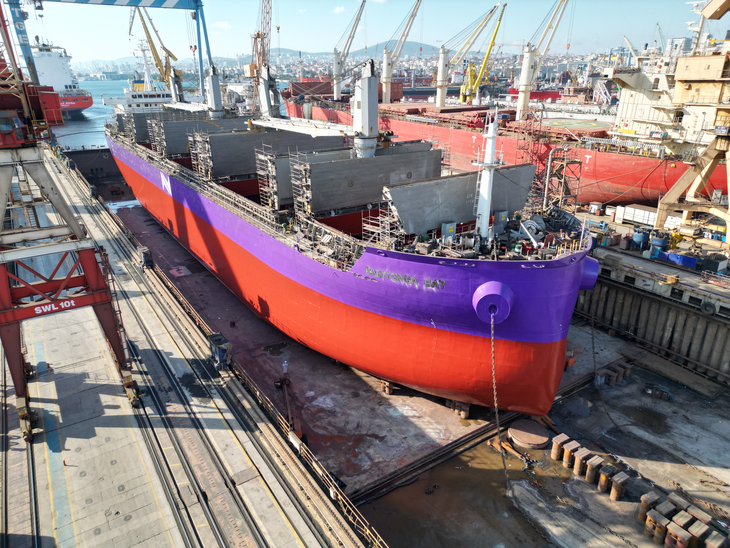
 Company News
Company News
The project was carried out in partnership with PPG, using the PPG SIGMAGLIDE® 2390 non-stick coating on the hull of the Babitonga Bay, reducing emissions and fuel consumption, and reinforcing the adoption of sustainable technologies in Brazilian shipping.
Press Office
Norsul — one of Brazil’s largest cabotage shipping companies — and PPG, a global leader in paints, coatings and specialty materials, have partnered to apply PPG SIGMAGLIDE® 2390, a high-performance non-stick coating, at the Gemak Shipyard in Turkey. The coating, applied to the underwater portion of the hull, prevents the accumulation of marine organisms such as barnacles and mussels. Free from biocides (no toxic components harmful to marine life), the product is applied using an electrostatic method.
Babitonga Bay is the first commercial vessel in Latin America to receive this type of coating, which — thanks to its ultra-smooth surface and non-stick properties — reduces greenhouse gas emissions, fuel consumption, and the environmental impact of maritime operations. Built in 2015, with a capacity of 39,000 tons, Babitonga Bay is part of Norsul’s own fleet. Acquired in the second half of 2024 for R$125 million, the vessel represents a significant reinforcement in the company’s operational capacity and customer service. With this addition, Norsul has consolidated its position as one of Brazil’s leading shipping companies in terms of fleet size.
Biofouling is the accumulation of marine organisms, such as barnacles, polychaetes and mollusks, on the submerged parts of vessels. This process begins as soon as the ship enters the water and, if uncontrolled, increases drag, raises fuel consumption, and accelerates hull corrosion, directly affecting operational efficiency and maintenance costs. According to a 2020 study by the Clean Shipping Coalition, hull fouling costs ship operators an estimated US$30 billion per year due to the higher fuel consumption associated with increased hull drag.
“That’s why proactive biofouling management is essential to maintain optimal vessel performance and protect marine ecosystems. The adoption of this technology reflects our ongoing commitment to innovation, combining efficiency, safety, and environmental responsibility,” says Aline Carvalho, Director of People, Management and Fleet at Norsul.
PPG SIGMAGLIDE® 2390 is a silicone-based coating developed with HydroReset™ technology, which creates an extremely smooth, low-friction surface that marine organisms do not recognize, and therefore do not adhere to. This feature also reduces friction between the hull and the water, decreasing engine load and consequently lowering fuel consumption. Based on studies aligned with ISO 19030 and International Towing Tank Conference (ITTC) standards, the coating can reduce CO₂ emissions by up to 35% and propulsion power requirements by up to 20% compared to traditional anti-fouling coatings. It also extends hull life for more than ten years, with minimal maintenance needs.
In the electrostatic application, electrically charged paint particles are precisely directed toward the grounded surface of the hull, ensuring greater adhesion and uniformity, forming an ultra-smooth and durable layer. Thanks to the higher transfer efficiency compared to conventional airless spray methods, this process significantly reduces overspray and material waste. Additionally, it lowers volatile organic compound (VOC) emissions and improves working conditions for applicators, reducing exposure to vapors and residues.
The Babitonga Bay’s performance will be monitored through digital tools tracking fuel consumption and energy efficiency, ensuring accurate performance and emissions data. The coating also helps vessels comply with the International Maritime Organization (IMO) greenhouse gas targets and international energy efficiency indexes — EEXI, EEDI, and CII — while supporting the Getting to Zero Coalition 2030 goals led by the World Maritime Forum. PPG introduced the electrostatic coating application method to the maritime industry two years ago.
With over six decades of operation, Norsul continues to incorporate practices that combine competitiveness, safety, and environmental responsibility. The investment in Babitonga Bay exemplifies how the company is turning its operations into a testing ground for sustainable solutions in Brazilian navigation.
The company is also accelerating its decarbonization and innovation agenda through investments in:
Since 2020, Norsul has been a signatory of the Getting to Zero Coalition and operates an online atmospheric emissions monitoring system, integrating sensor data and carbon intensity indicators (CII Rating).
The company also participates in the Green Logistics Program Brazil and holds the Gold Seal of the Brazilian GHG Protocol Program.
“We will continue to strengthen our role as a national benchmark in bulk and dedicated cargo maritime transport — combining technical excellence, operational efficiency, sustainability, and a clear vision for the future,” concludes Aline Carvalho.
Contact us